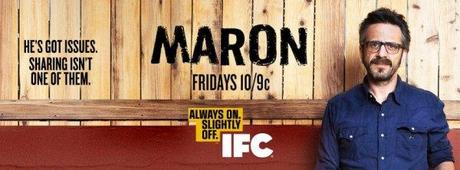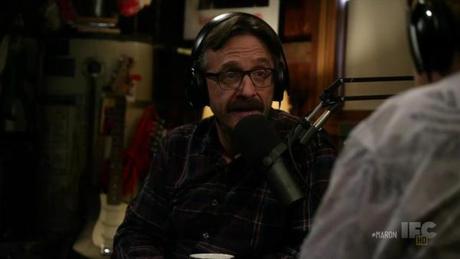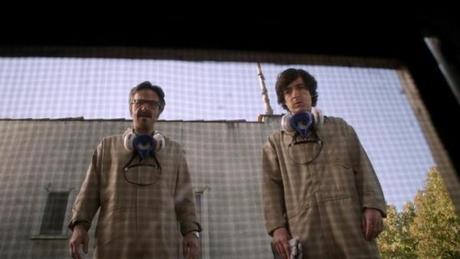May may just be the month of Marc Maron. The stand-up comedian is not new to the scene, having begun his forays into show business alongside the likes of David Cross, Sarah Silverman, and Louis C.K. in the late ’80s and early ’90s, but it is only in the last few years that he has garnered considerable attention due to the success of his podcast interview show WTF. In early 2011, the New York Times featured Maron’s podcast as a “must-hear” for comedians, and of course he has come up on Humor in America, most recently as “a revelation.”
This May, Maron is popping up in the mainstream as never before, issuing a new book entitled Attempting Normal, getting interviewed by Terry Gross, Howard Stern, and Jay Leno — and debuting his own television show on IFC, simply titled Maron.

One of the main reasons that stand-up comedians continue to have television shows built around their personalities is that the stand-up trade requires the creation of a detailed-yet-instantly-recognizable persona. It’s easily transposed to television, but Maron frequently refers to himself as an acquired taste, not for everyone. Indeed, the plot of the premiere episode makes much of that, as Maron cajoles a woeful Dave Foley into accompanying him on a hunt for someone who’s been pseudonymously insulting the podcaster via Twitter.
(By the way, I highly recommend Dave Foley’s real-life appearance on WTF for a discussion of the Kids in the Hall star’s ups and downs in Hollywood, including patented WTF-glimpses into Foley’s tangled personal life.)
For example, Dragonmaster tweets Marc Maron: “I would say don’t quit your day job, but you don’t have one, and it’s too late to get one.” Maron fans will recognize that as an external manifestation of Maron’s internal self-judgment. The dude is a volcano of self-judgment.
Episode One does a decent job setting up some of the Maron essentials. This includes his Twitter addiction, of course. His first ex-wife. His cats. The tension between his exhausting self-involvement and his deep self-awareness. The podcast set-up in his garage.

What Episode One doesn’t capture is Maron’s exquisite timing. Some of the bits culled from his stand-up act don’t work as well on the small screen, such as that voice within that urges him to f#$k things up, and the expression of negative emotions he has towards the second ex-wife. But I don’t think it’s a limitation of the sitcom medium so much as that common awkwardness of a sitcom trying to find its voice.
And if we can judge by Episode Two, Maron found his voice quickly. The second episode expertly weaves together multiple plots, including Dennis Leary, a clueless twenty-five year old desperate to enter show business, and a dead possum.

Maron’s real-life difficulties with boundaries make for good sitcom fodder. He’s a decent actor; playing oneself can be tricky, but as a stand-up Maron has had plenty of practice. He’s sharply funny, as always, but his strengths on the stage and on his podcast also include an extraordinary knack for storytelling. My hope is that Maron the television show will continue to develop that same mix of the funny with drama and timing. If you’re interested in checking out the show, IFC currently has a full episode available on Maron’s web site.
Matthew Daube holds an M.F.A. in Playwriting from Smith College and a Ph.D. in Theater and Performance Studies from Stanford University. His dissertation, “Laughter in Revolt: Race, Ethnicity, and Identity in the Construction of Stand-up Comedy” argues for the recognition of stand-up comedy as a distinct performance mode that emerged in the United States following World War II, linked to issues of race and focused on the performance of self. He is particularly interested in the intersections between humor and the performance of identity, and has published articles on the use of ethnic stereotype by the Marx Brothers and the role of the audience in stand-up comedy. Matthew is also a founding member of the San Francisco producing company The Collected Works.
